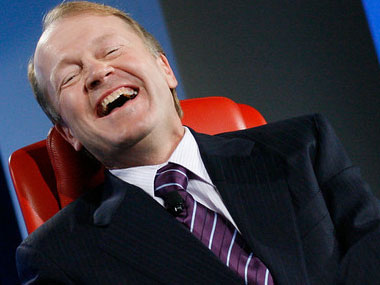Cisco Systems Beats the Street After Restructuring
 Networking giant Cisco Systems looks like it’s getting back in fighting trim, after reporting quarterly earnings of 43 cents a share on sales of $11.3 billion.
Networking giant Cisco Systems looks like it’s getting back in fighting trim, after reporting quarterly earnings of 43 cents a share on sales of $11.3 billion.
The results were better than the consensus expectation of analysts who had called for Cisco to report earnings of 39 cents per share on sales of $11.02 billion. Cisco shares rose 1.5 percent after hours, but fell by more than 4 percent during the regular session, closing down 75 cents at $17.56 price.
In a company statement, CEO John Chambers called the results a “a solid quarter,” and went on:
“We’ve completed the majority of our restructuring and have organized Cisco to successfully execute against our strategy of providing intelligent networks, architectures and integrated products that solve customers’ business problems. Even in times of limited capital spending, intelligent networks are being deployed to drive new business, revenue and consumption models, enable new customer and employee experiences, and drive efficiencies. Cisco’s leadership in networking, video, collaboration and cloud, offered together in an integrated architectural approach, uniquely positions Cisco as a strategic business partner.”
Cash flow from operations was $2.3 billion compared with $1.7 billion for the first quarter of fiscal 2011. On a conference call with analysts, Chambers said orders for products grew 13 percent. Gross margin in the quarter was 62.4 percent.
Cisco exited the quarter with combined cash, cash equivalents and investments worth $44.4 billion, down slightly compared with $44.6 billion at the end of fiscal 2011. The company used $1.5 billion of its cash to buy back 100 million shares at an average price of $15.37 per share.
Cisco CFO Frank Calderoni said the company expects revenue in the second quarter in the range of $11.14 billion to $11.24 billion. This is slightly higher than the consensus expectation of $11.13 billion, which would represent revenue growth of about 7 to 8 percent. Per-share earnings will be 42 cents to 44 cents slightly ahead of the street, which is at 42 cents. Calderoni said Cisco expects to see a gross margin of between 61.5 percent and 62 percent. This includes $100 million worth of expected restructuring charges.
Update: So where were the strengths and weaknesses? The cloud for one thing. For one Cisco’s Cloud business where orders grew an eye-popping 122 percent. This is the business where Cisco is taking on bigger companies like Hewlett-Packard and Dell in supplying compute infrastructure for data centers. Its product here is the Universal Computing System that it jointly runs with VMWare and EMC. Cisco’s revenue here is up 116 percent. Nice growth indeed, but as a percentage of revenue, it was pretty small in the quarter, amounting to just a hair above 2 percent. Still, Cisco added 1,572 new customers to its growing stable of UCS customers, which now numbers nearly 9,000.
Collaboration, which includes the video and TelePresence business saw orders grow 16 percent and revenue grow 12 percent in the quarter. This is a much bigger business, and amounted to more than $1 billion or nearly 10 percent of sales.
On the , Chambers, in response to a question about the strength of the financial sector said Cisco is working with a “very very large financial company,” that he would not name, though it is a US company. “We’re aligning at the hip,” Chambers said, in how the company — it sounded like a big retail bank or investment house given the way he described it — collaborates with its financial advisers and its branch locations.
Usually these deals are done with a lot of secrecy. Banks don’t like other banks knowing whose gear they’re using lest they give away a competitive secret, but Chambers is clearly bursting at the seams to talk about it, and if its a big enough deal, perhaps we’ll learn who its with soon.








